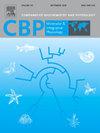Olfactory specialization in the Senegalese sole (Solea senegalensis): CO2 acidified water triggers nostril-specific immune processes
IF 2.2
3区 生物学
Q4 BIOCHEMISTRY & MOLECULAR BIOLOGY
Comparative Biochemistry and Physiology A-Molecular & Integrative Physiology
Pub Date : 2025-02-04
DOI:10.1016/j.cbpa.2025.111820
引用次数: 0
Abstract
Increased carbon dioxide (CO2) in the ocean is changing seawater chemistry. Behavioural alterations in CO2 exposed fish have been linked to changes in the central nervous system (CNS). However, we hypothesise that receptor cells in direct contact with the environment are more susceptible to changes in water chemistry than the CNS. Electrophysiology, histology, and transcriptomics were used to explore the effect of exposure to CO2 acidified water on the olfactory epithelium (OE) of the Senegalese sole (Solea senegalensis). The upper and lower OE of this flatfish detect different odorants and are in contact with different environments. Acute exposure to acidified water decreased olfactory sensitivity more in the upper than in the lower OE. After chronic exposure to high CO2 there were no histological changes in the upper OE; however, in the lower OE, there was a massive infiltration of melanomacrophage (MMC) and tissue disorganization. In addition, in the upper OE, differential expressed gene transcripts (DETs) were related to inflammation and innate immune processes whereas in the lower OE, DETs were related to the adaptative immune response. Differential regulation of genes related to neurogenesis and plasticity occurred in both epithelia.
The effects of ocean acidification in sole OE depends on the nostril; however, the occurrence of an exacerbated immune response, OE remodelling and reduced sensitivity indicate that ocean acidification is likely to have significant and unpredictable consequences for behaviour.

塞内加尔比目鱼(Solea senegalensis)的嗅觉专业化:二氧化碳酸化水触发鼻孔特异性免疫过程。
海洋中二氧化碳(CO2)的增加正在改变海水的化学成分。暴露在二氧化碳中的鱼类的行为改变与中枢神经系统的变化有关。然而,我们假设与环境直接接触的受体细胞比中枢神经系统更容易受到水化学变化的影响。电生理学、组织学和转录组学研究了暴露于二氧化碳酸化水对塞内加尔比目鱼(Solea senegalensis)嗅觉上皮(OE)的影响。这种比目鱼的上下OE能探测到不同的气味,并与不同的环境接触。急性暴露于酸化水中,OE上部的嗅觉敏感性比OE下部的嗅觉敏感性降低得更多。慢性高CO2暴露后,OE上部没有组织学变化,OE下部有大量黑素巨噬细胞(melanomacrophage, MMC)浸润和组织紊乱。此外,在OE上部,差异表达基因转录本(differential expressed gene transcripts, DETs)与炎症和先天免疫过程有关,而在OE下部,差异表达基因转录本与适应性免疫反应有关。神经发生和可塑性相关基因的差异调控发生在两种上皮中。海洋酸化对单一OE的影响取决于鼻孔,然而,免疫反应加剧、OE重塑和敏感性降低表明,海洋酸化可能对行为产生重大和不可预测的后果。
本文章由计算机程序翻译,如有差异,请以英文原文为准。
求助全文
约1分钟内获得全文
求助全文
来源期刊
CiteScore
5.00
自引率
4.30%
发文量
155
审稿时长
3 months
期刊介绍:
Part A: Molecular & Integrative Physiology of Comparative Biochemistry and Physiology. This journal covers molecular, cellular, integrative, and ecological physiology. Topics include bioenergetics, circulation, development, excretion, ion regulation, endocrinology, neurobiology, nutrition, respiration, and thermal biology. Study on regulatory mechanisms at any level of organization such as signal transduction and cellular interaction and control of behavior are also published.

 求助内容:
求助内容: 应助结果提醒方式:
应助结果提醒方式:


